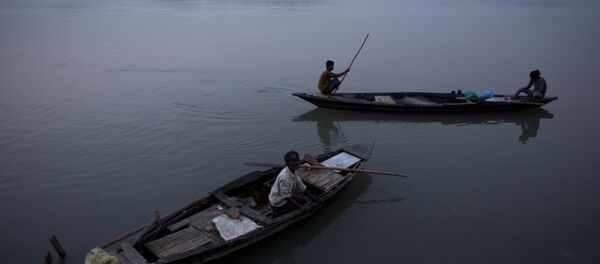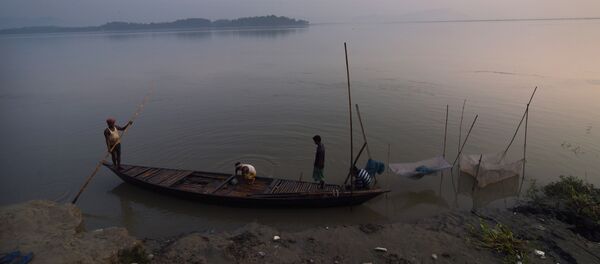New Delhi (Sputnik) — As the turbid water of Siang has caused an ecological catastrophe in the northeastern part of India, people from the region have launched a massive protest demanding immediate action by the government to check the deteriorating quality of the river water.
"We will not stop here. We are moving the central government to demand a solution to the problem under the international water policy. The entire state is suffering but no action has yet been taken by the BJP-led government both at the central and the state level. The issue should be immediately taken up with China," Lurin Jyoti Gogoi, general secretary of the All Assam Students' Union (AASU), told Sputnik.
#AASU (All ASSAM STUDENT UNION) activists making human chain on the bank of river #Brahmaputra demanding the government to take immediate action to cleanse the Brahmaputra water.@guwahaticity @keshab_mahanta #Assam #Guwahati pic.twitter.com/2wZ4vDjv0c
— G PLUS (@guwahatiplus) December 11, 2017
The Brahmaputra is the lifeline of millions of people residing near the border with China. A report prepared by the Assam Pollution Control Board claims that Siang's Nephelometric Turbidity Unit (NTU) is at a "dangerous" level. An independent sampling test conducted by the North East Dialogue Forum (NEDF) has noticed a 6-10 inch thick layer of sediment accumulation on the riverbed.
WARNING: The following photo is graphic and may offend sensibilities

Meanwhile, Himanta Biswa Sarma, Assam's health minister, has alleged that the river water has turned turbid either due to the construction of a dam by China or some accident that has occurred on the Chinese side of the river.
The governments and people of the affected states were hoping that the Foreign Minister would raise the issue with her Chinese counterpart who was in New Delhi recently for the Russia-India- China foreign ministers' meet held on December 11. But, the hope was dashed when India's Ministry of External Affairs said that the issue would only be raised with China only after a comprehensive testing of the water and the reason behind it.
"Let us not jump to conclusions. Let us first ascertain the details and the facts in the matter, which we are doing. You are also aware that we have an existing mechanism between the two countries to deal with such matters. There is a mechanism on the exchange of hydrological data on cross-border rivers, which is an important part of functional cooperation which we have with China. There are also other institutionalized mechanisms to exchange views on issues of common concerns. Once we get facts about the case as to why it is happening then we move to the other stage whether we should take it up with concerned government or not," Raveesh Kumar, the official spokesperson of India's Ministry of External Affairs, had said last week.




